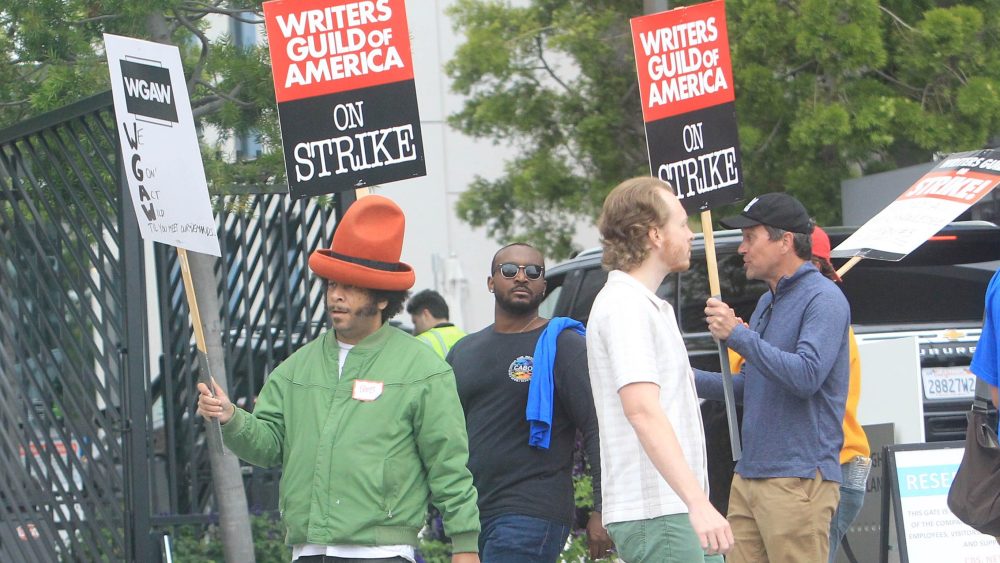Showrunners on Strike Discuss How Producing is Writing
During the early days of the 2007-08 writers strike, even after pens went down, many showrunners were still at work. They weren’t writing, but they were handling other aspects of production as cameras continued to roll on preexisting scripts. Eventually, they realized that showrunners might take themselves out of writing, but there’s no way to take writing out of showrunner duties.
“It’s obviously part of the storytelling process, because you need a showrunner to keep a sense of the overall story,” says one high-profile writer-producer. “Every decision you’re making, from a craft services
decision to a costume decision, is something only you can make because you’re putting it into a whole story. There’s no part of my job that isn’t storytelling.”
The studios disagree. As the current writers strike began, showrunners began receiving letters warning them that they must continue to provide services such as “non-writing production and post-production work.” But the WGA says those so-called “(a) through (h) services” — including bridging material necessitated by cutting for time, changes in technical or stage directions and changes needed to obtain continuity acceptance or legal clearance — are still considered writing.
“I think it’s outrageous,” Kari Lizer, whose credits include showrunning ABC’s “Call Your Mother,” tells Variety. “Writing is writing. I think it’s union busting.” On social media, most showrunners agree with that assessment. Sharing that filming on her Starz series “P-Valley” has been postponed, creator Katori Hall writes that “like many of my fellow showrunners, I feel as though my writing and producing duties are inextricably linked. We will not be filming until a fair deal is reached.”
Says another showrunner, who wished to remain anonymous: “A writer/showrunner has an imagining, a vision, and we are creating that vision every day from conversations in the writers room all the way through the final edit. For example, when a cut comes in five minutes over, it is your job as a writer/showrunner to figure out – painstakingly – where to take those five minutes out. Then, your job is to write new dialogue within the scenes that are staying in the show to bridge the information you lost in the scenes that you cut. Your job is to do this seamlessly so the audience never knows or notices that whole scenes are missing. This is an art form. It is also writing. So when I got a letter from my studio, suggesting that my ‘showrunning’ must continue even though I’m no longer ‘writing’ I found it laughable. I just didn’t respond because that would’ve required picking up a pen and pens are fucking down.”
Boots Riley, who’s behind the new Amazon Prime Video series “I’m a Virgo,” wrote that as a member of the DGA, he recently received a letter saying that “DGA members who are also WGA could still perform services that the WGA has asked us not to do during the strike. I, and a bunch of other dual DGA/WGA members, have decided we won’t be taking that advice… this is a move of solidarity which will make the strike go faster.”
That DGA letter, which Variety has obtained, says that “the WGA has threatened to discipline hyphenate members who provide “(a) through (h) services” on struck projects. Hyphenate directors, however, are required by the ‘no strike clause’ in the DGA Basic Agreement to continue providing directing services during the WGA strike, and their responsibilities traditionally include ‘(a) through (h)’ services.
If the Employer does not request in writing that you perform your directing services, then you have the right to refuse to do that work; the Employer cannot discipline you but may temporarily replace you. If the Employer does make the request in writing, you must continue to perform your DGA-covered services and your employer must indemnify you from any monetary loss, including costs of defense, arising from any WGA disciplinary action against you. You should also consult your attorney.”
Multi-hyphenates say they’re also still figuring out what the line is in terms of promoting their shows. David Mandel has been a showrunner for series like “Veep,” but focused on directing for the new HBO show “White House Plumbers.” “Even though I am the director, I felt a little strange about, I don’t know how much to promo this thing,” he says. “But pens are down, and I’m not crossing a picket line. I’ll be on a picket line.”
As for productions moving forward without showrunner involvement, one producer bristles at the idea. “The creative point of view is usually why people make these shows, and if you don’t have that when you’re finishing something, you can take something that’s good and screw it up,” he says. “But it isn’t easy, because I fundamentally believe that no AMPTP member thinks they would screw up a show without a showrunner — but they probably would.”
Studios have been selective in suspending deals with writers: Some have halted all overall deals; others are holding back on sending letters to showrunners whose series are still in production. However, as those creators hold fast in not crossing picket lines, the studios must decide soon whether to send additional notices.
In the meantime, showrunners have been busy putting their projects in mothballs (to resume once the strike is over) and figuring out how to pay their teams as their deal funding is halted. “Mostly, I’ve been making sure my employees are covered financially,” one producer says, “and helping calm the level of anxiety. We struck on a Monday, and everybody in the office lost their check that Friday. For the assistants and others, their checks are already meager. And then they lose them. So up until now, that’s the focus.”
Jennifer Maas and Gene Maddaus contributed to this story.

